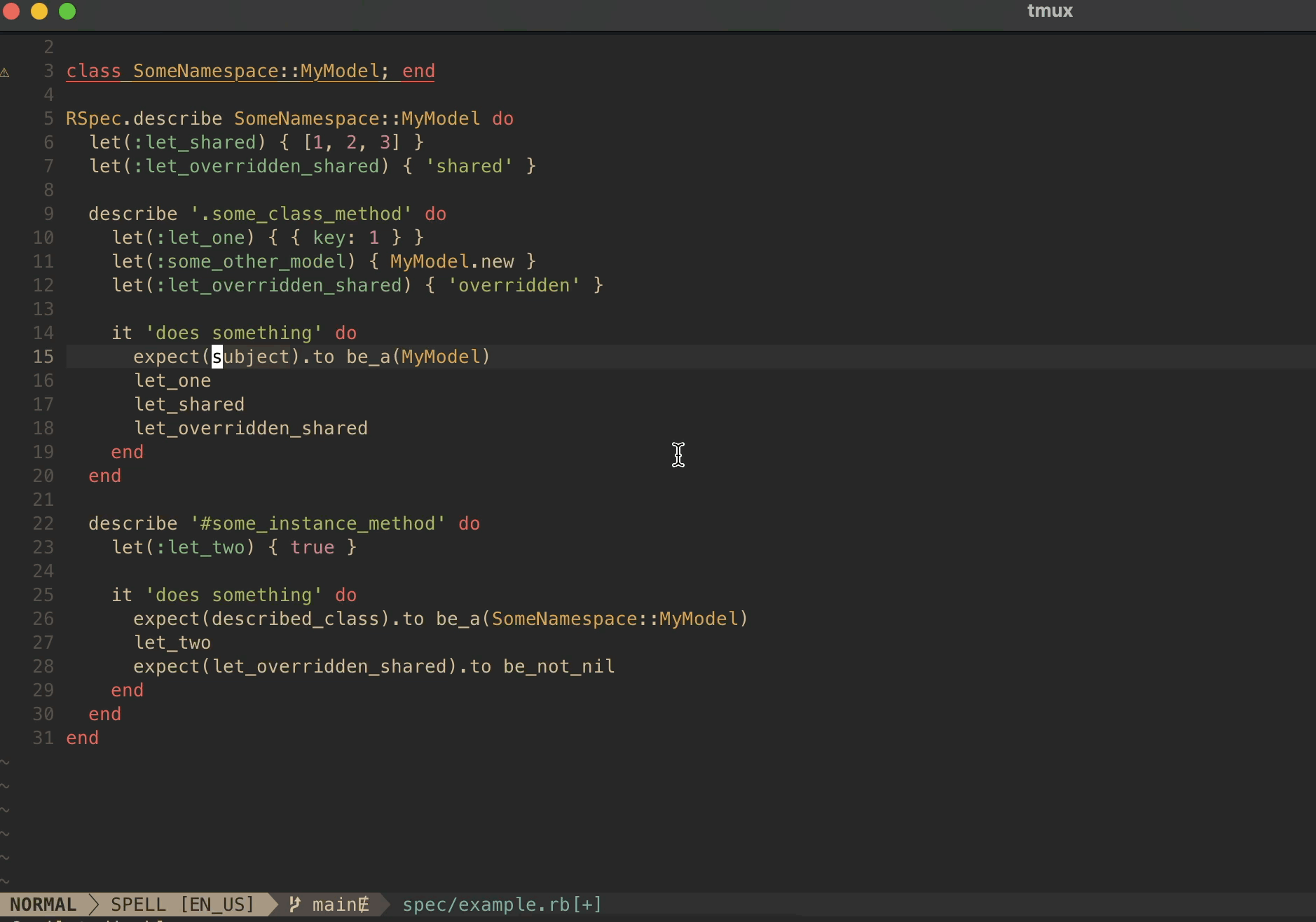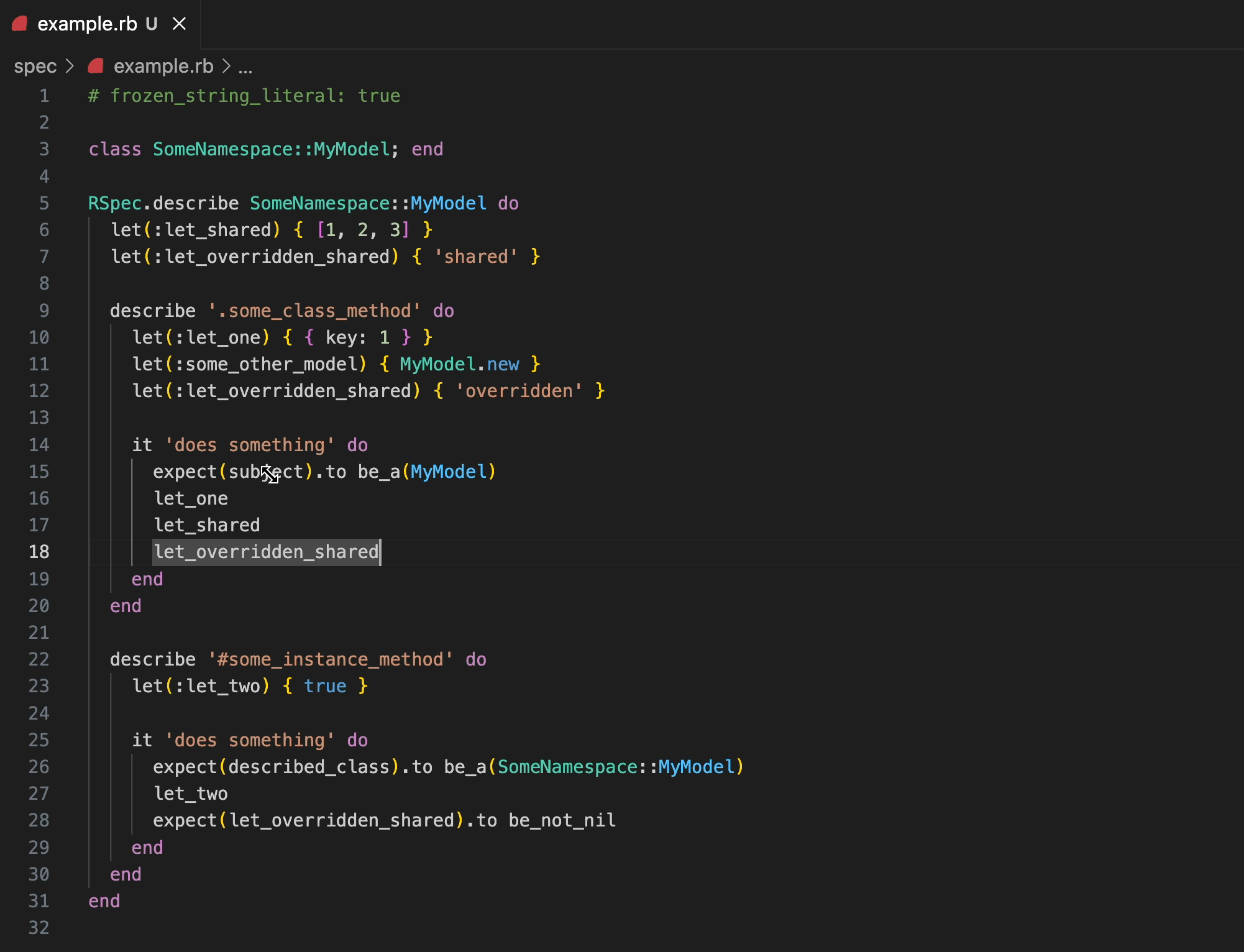Solargraph::Rspec - A Solargraph plugin for better RSpec support
RSpec is a testing framework of choice for many Ruby developers. But at the same time is highly dynamic and heavily relying on metaprogramming making it hard to provide accurate code completion and type inference.
This gem aims to provide better support for RSpec in Solargraph and it supports the following features (completion, jump to definition and type inference 🚀):
describeanditmethods- memoized
letandlet!methods described_classwith appropriate type inference- implicit and explicit
subjectmethods - one liner syntax helpers
is_expected,shouldandshould_notlinked to the appropriate subject - Core and 3rd party spec helpers & matchers
- Custom DSL extensions support (see Configuration section)
- and more to come... ⏲️
Install the gems from the command line:
gem install solargraph solargraph-rspecOr add it to your Gemfile:
group :development do
gem 'solargraph', require: false
gem 'solargraph-rspec', require: false
endIf you add them to your Gemfile, you'll have to tell your IDE plugin to use bundler to load the right version of solargraph.
Add solargraph-rspec to your .solargraph.yml as a plugin.
Caution
To avoid performance issues, please keep the spec/**/* directory in exclude list in the Solargraph configuration.
That does not actually exclude the specs, but rather avoids pre-indexing the specs when Solargraph boots up, and only parses
the specs on demand when opened in the editor, which is what we usually want.
(if you don't have a .solargraph.yml in your project root, you can run solargraph config to add one)
@@ -2,7 +2,6 @@
include:
- "**/*.rb"
exclude:
+- spec/**/*
- test/**/*
- vendor/**/*
- ".bundle/**/*"
@@ -18,5 +17,6 @@ formatter:
only: []
extra_args: []
require_paths: []
-plugins: []
+plugins:
+ - solargraph-rspec
max_files: 5000If you have your own custom let-like memoized methods, you can add them to your .solargraph.yml file like this:
# .solargraph.yml
# ...
rspec:
let_methods:
- let_it_beIf you have your own custom example-like methods like it, you can add them to your .solargraph.yml file like this:
# .solargraph.yml
# ...
rspec:
example_methods:
- my_itThis is useful if you use gems like rspec-given which introduces its own let and example methods.
Solargraph utilizes the YARD documentation to provide code completion. If you want to have completion for gems in your project, you can generate YARD documentation for them (Read more).
Run yard gems to generate documentation for your installed gems.
Run yard config --gem-install-yri to generate YARD documentation automatically when you install new gems.
This gem is inspired by the solargraph-rails which gave me an idea of how to extend Solargraph with custom features and provided me with simple and very understandable test suite which helped me to get started with playing around with Solargraph.
In fact, most of the code I initially wrote on a fork of it, but then I realized that it would make more sense to extract it into a separate gem where it could be used by non-Rails projects as well.
It also goes without saying that the Solargraph gem itself is a great tool that it has helped me a lot in my daily work and I'm very grateful to @castwide for creating it and maintaining it. ❤️
It's codebase IMO is an exemplary of how Ruby code written in a very simple POROs without any wild metaprogramming magic and supplemented with YARDocs, for such a complex tools can be very readable and understandable even for a total newbie like me in this domain!
GitHub Issues are the best place to ask questions, report problems, and suggest improvements.
Code contributions are always appreciated. Feel free to fork the repo and submit pull requests. Check for open issues that could use help. Start new issues to discuss changes that have a major impact on the code or require large time commitments.
Contributing is easy:
- Create a fork and clone it
- Run
bundle installto install dependencies - Run
yard gemsto generate YARD documentation for your installed gems - Run
bundle exec specto run the tests - Introduce your awesome changes
- Ensure they are well covered with tests
- Record your changes in the CHANGELOG.md
- Submit a pull request 🚀
The gem is available as open source under the terms of the MIT License.

